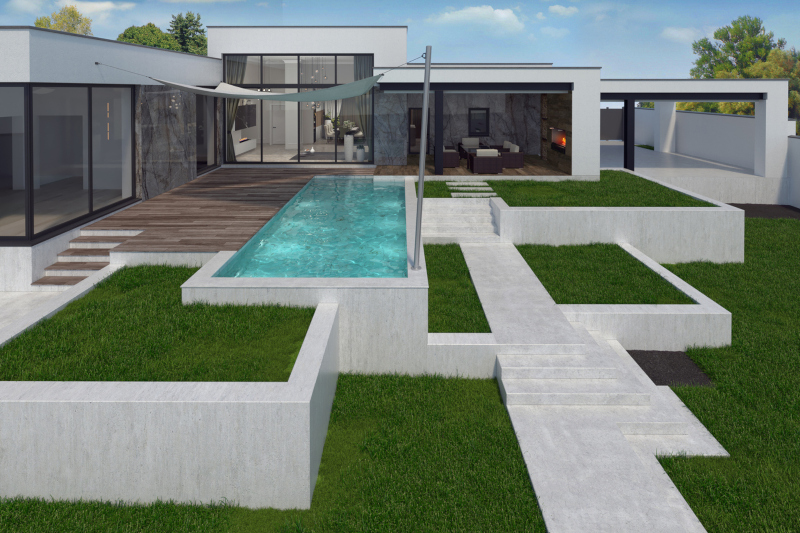You may be more familiar with the common forms of pavers made of stone or concrete. Yet, the variety of finishes, patterns and benefits found in porcelain pavers are causing them to grow in popularity. Before you finish off your pool deck, let’s explore the benefits of porcelain pavers.
Porcelain has been around for centuries
According to Britannica.com, “Porcelain was first made in China – in a primitive form during the Tang dynasty (618–907) and in the form best known in the West during the Yuan dynasty (1279–1368). This true, or hard-paste, porcelain was made from petuntse, or china stone (a feldspathic rock), ground to powder and mixed with kaolin (white china clay).”
The type of porcelain many of us are familiar with is designed for indoor use in the form of vases, tableware and figurines. These items are often prized for their delicate thinness, sometimes to the point of translucency. Not so with the pavers.
1. Did you know that porcelain pavers are more durable than concrete or stone?
Porcelain pavers are not only durable, they are also long lasting. Today, the process of creating porcelain pavers has evolved to create a much thicker, stronger, versatile porcelain, suitable for outdoor use. In fact, porcelain pavers are stronger than cement and can take heavy loads without damage. Long exposure to hot sun will not affect their kiln-fired finish, which makes them highly fade resistant.
2. Did you know that porcelain pavers are the chameleons of the paver world?
The modern process of taking kiln-fired clay and decorating it with inkjet printing can mimic just about any material, from stone to wood, with many amazing designs in between. The colors and variety are expansive, allowing you to choose a design that best suits your landscaping theme.
3. Did you know porcelain pavers are nonporous?
This nonporous feature means that water is not absorbed into the pavers, which makes them mold- and mildew-resistant, along with stain-resistant. These are great advantages for pool decking. Because they don’t absorb moisture like stone and concrete, they are less likely to crack when temperatures change. Marin, Napa and Sonoma Counties don’t experience much icy weather. However, freezes are not unknown, and as the climate changes, if unexpected weather patterns bring more frequent freezing temperatures, porcelain pavers will remain unaffected.
4. Did you know that porcelain pavers are heat- and slip-resistant?
If you’ve ever walked barefoot on concrete or tiles made hot in direct sunlight, you’ll be glad to know that porcelain pavers are naturally much more resistant to holding heat from the sun. Choosing a lighter color pattern helps, too. In addition, porcelain pavers are slip-resistant, an essential trait for anyone walking on a wet surface. This makes them a great choice for pool decking where walking barefoot with wet feet is part of the fun!
5. You’ll be happy to discover that porcelain pavers are very low maintenance.
Due to many of the qualities we’ve detailed that include a nonporous, mildew-, stain-, scratch- and fade-resistant finish, maintaining the beautiful look of porcelain pavers is relatively simple. Keeping them free of debris is the only form of regular maintenance you need. They don’t require sealing or resealing as stone pavers do.
If you would like to learn more about the benefits of porcelain pavers for your pool decking or patio area, call AplosGroup today.


